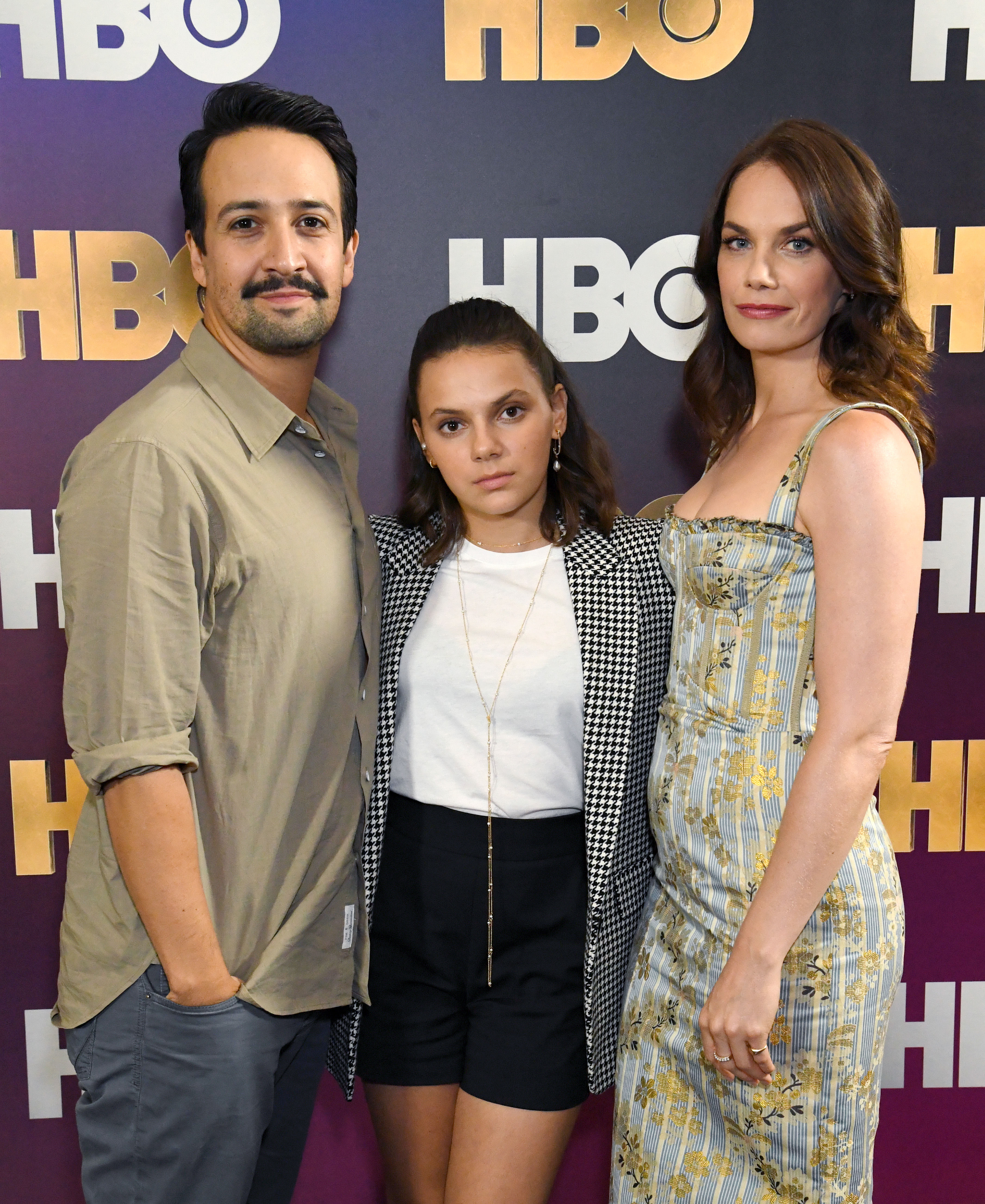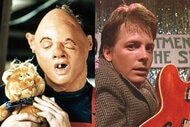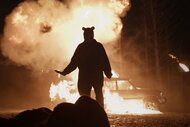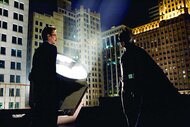Create a free profile to get unlimited access to exclusive videos, sweepstakes, and more!
TCAs 2019: HBO's His Dark Materials will 'sound every note' in Philip Pulman's series

Though the new adaptation of Philip Pullman's classic fantasy series His Dark Materials recently unleashed a trailer and a panel full of information at San Diego Comic-Con, the cast and creators of the new BBC/HBO co-production did not leave things there. They were a big part of HBO's panel at the 2019 TCAs in Beverly Hills, California today, and SYFY WIRE was there to grab as much dust as possible.
Present was executive producer and writer Jack Thorne (Harry Potter and the Cursed Child), executive producer Jane Tranter, as well as castmembers Dafne Keen (Lyra Belaqua), Ruth Wilson (Mrs. Coulter), Lin-Manuel Miranda (Lee Scoresby), and, via satellite from Philadephia, James McAvoy (Lord Asriel).
One of the first questions asked was who is voicing the iconic armored polar bear from the books, Iorek Byrnison? Thorne did not reveal the actor's name, but did say that he was on set, voicing lorek live while using a puppet as a stand-in. Keen (who played Laura Kinney/X-23 in Logan) acted alongside this puppet (Lyra and Iorek share many scenes), and mentioned how the actor could "change his voice [from] average human being to bear in a second."
How is the team going about breaking down the three books in the series, called Northern Lights (The Golden Compass in the U.S.), The Subtle Knife, and The Amber Spyglass? Thorne noted that their approach is largely to use one book per season, but added: "I’ve stolen a few bits from other books for this season. It was looking at all three books [to] figure out how we could celebrate them in the best way, and sometimes that was moving things forward."
In terms of the current relevancy of the books (which is huge at the moment), Keen said, "I feel it’s very needed right now. We don’t usually have young woman leads. It’s not in abundance and portraying someone so strong and a hero, it’s a privilege." Thorne tagged on, saying, "The thing that I think is most beautiful and tried to keep in my head, if this was a Marvel movie this would be Asriel’s story. But he [author Philip Pullman] doesn’t do that, he does it through Lyra. She is constantly interested in doing the right thing and the good thing. We’ve tried to keep that all the way through."
Because the books deal with an oppressive organization that manipulates religion and faith to serve their own selfish ends, the stories often get labeled as being "anti-religious." Indeed, the original attempt to turn the books into a film series (The Golden Compass in 2007) encountered some boycotts. Is the team behind the show worried about history repeating itself? To hear Tranter talk about it, no.
"We’re not concerned because we’re adapting across the board," she said. "What happens with film, you have to cut down. We have eight episodes per book so we can sound every note that Philip sounded. We make clear the religious controversy was not relevant to the books. His Dark Materials talks about oppression, the falsification of information."
She went on to mention the institution of oppression in the series, called "The Magisterium," saying, "There is no organization today that is a direct correlation. Looking back in time, you could look at the printing press or the Cold War as things he was digging at. He was getting to themes of truth coming out to the general population. It’s not an attack on religion.They are full of faith and belief." Keen then added that she saw the Magisterium "more as Big Brother in 1984."
"I think Philip Pullman is talking about oppression everywhere," said Tranter, to which McAvoy added, "I think he was talking about everyday oppression. We absorb it so much that we’re afraid to say to our contempories if something is logical. We’re terrified to support people to say what they believe.That’s at the extreme level. The more grey area is we’re terrified to say something. If more than 10 people disagree on the internet, then a story comes out lambasting, and that comes from within too. Philip Pullman is talking about reasonable thought never being limited."
As the books take place in different universes — first in Lyra's familiar (but hardly identical) universe, and then... well, some different ones later on — the series requires some exposition in its opening to be able to function. How does the team go about controlling that for an audience? As Thorne said, it involved "a lot of trial and error."
"We wrote many drafts to try to find a way to tell the story as elegantly as possible," he said. "Philip Pullman's dense-ness is a blessing and a curse. It’s a very challenging, yet glorious show to write. ... Philip shows you the top of the mountain of glorious-ness. It has a child lead, talking animals... he gives you an enormous level of fantasy and fun. There’s nothing more delicious than the villainy of Mrs. Coulter. It’s fantasy embedded in something. As adapters, we took the glorious notes and joined them together. We found the connective tissue."
Tranter added that she saw the show as being comprised of 16 episodes rather than two seasons, which is partly how it was pitched. Part of this was due to the logistics of some of their lead actors getting older by the day.
"As we move from one season to the other, we have children in the series growing quickly so we had to find a way of turning the piece around quickly," Tranter said. "There is a great theme of a girl going through puberty and we wanted to pace it out appropriately. For me, I think it’s a quintessential BBC/HBO production. They are highly regarded literature and it felt right to have a place in the U.K. with one of its broadcasters. It also felt very HBO to us. It felt natural."
With all of this talk of multiverses, what are some of the challenges of putting them onscreen? Tranter said that they began (like the books do) in Lyra's world. "We made decisions in design. We made certain choices that Lyra’s world hasn’t industrialized. It also has the Magisterium which has suppressed knowledge. One of the greatest things of fantasy is you can think about our world differently with its lens."
This extends to costuming as well, with Wilson commenting on the look of the villainous Mrs. Coulter. "She looks slightly period with a mix of styles and eras. In the first season, it’s Lyra’s world and then you can start moving from that. It’s been exciting discussing how characters move through other worlds. You as the character have to adapt. It’s not now, but not too far from our world. It was fun trying to find that out." She then mentioned the concept of "daemons" that features heavily in Lyra's world — people there have a bit of their souls walking and talking to them as different animals.
"What’s amazing in this world is that daemons are their souls," Wilson said, saying that her own was a simian, referring to Coulter's famous Golden Monkey daemon. McAvoy added to this, mentioning that the books are some of his favorite of all time, and that he never saw himself in this role. "...but I have a snow leopard in me," he said, referring to Asriel's snow leopard daemon, Stelmaria. "At puberty you look at your daemon. You get to look at yourself and talk to your soul in a way we can’t," he said.
Miranda then wanted it known that as a super-fan of the series as well, he would have been happy to play McAvoy's snow leopard daemon.
His Dark Materials comes to HBO (at least Stateside) this fall.














